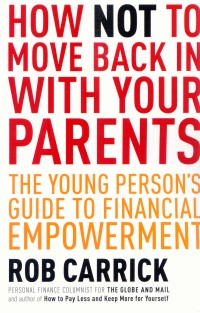| ________________
CM . . .
. Volume XVIII Number 33. . . .April 27, 2012 
 |
How Not to Move Back in With Your Parents: The Young Personís Guide to Financial Empowerment.
Rob Carrick.
Toronto, ON: Doubleday Canada, 2012.
232 pp., trade pbk., $22.95.
ISBN 978-0-385-67192-7.
Subject Headings:
Youth-Canada-Finance, Personal-Juvenile literature.
Teenagers-Canada-Finance, Personal-Juvenile literature.
Finance, Personal-Canada-Juvenile literature.
Grades 8-12 / Ages 13-17.
Review by Rob Bittner.
*** /4
|
| |
|

excerpt:
Iím 48 as I write this, but I remember both the good and the bad financial decisions I made decades back. Youíll read about them here, and youíll also get the benefit of my more than a decade spent as personal-finance columnist for The Globe and Mail. I know the money challenges people face today. Iíve heard the success stories and the disasters.
Youíll find no lectures here, just clear and unbiased guidance on how you can get the best possible financial start to live as an adult. Letís get to work.
Financial columnist Rob Carrick has put together a wealth of information (pun intended) on how to become a financially independent young person on the way to a successful retirement in the future. There is advice for young people on how to prepare for post-secondary education, financial milestones such as the purchase of a first home or a first car, and getting ready to start a family. And there is advice for parents on how to best prepare young people for the future and for financial stability in an unstable world.
Should parents give students credit cards for emergencies? What do both parties do if a young person has to move back home after being away for a while? How do you plan for a future with a family, a home, and a successful retirement? How do RESPs work, and are they better than TFSAs? These are the types of questions that lead discussion throughout the text, giving advice for young people and parents who want financial stability and freedom in life.
While the financial advice appears to be soundóI canít vouch for it all personally as I am no financial consultantóthe writing style is somewhat convoluted, and the details are, at times, very overwhelming and complicated. There is valuable information about many different ways of saving money for different times of life. Carrickís advice for post-secondary students will be especially helpful for young people intending to attend university or college; the realities of post-secondary costs are often overlooked, but not here. Some of the later discussions on home-buying and starting a family will be helpful, but would most likely be something to refer to after the completion of post-secondary education.
Carrick is obviously knowledgeable, but his ability to pass on the information does get confusing at times, and the details can become bewildering if this is a personís first introduction to the world of personal finance. The book seems to be a compilation of previous columns and, therefore, does not read entirely smoothly. Overall, though, the book is worth looking through and keeping around for reference as one moves through life and begins the financially empowered journey into adulthood.
Recommended.
Rob Bittner is a graduate of the MA in Childrenís Literature program at The University of British Columbia in Vancouver, BC. He will begin doctoral studies at Simon Fraser University in September 2012.

To comment
on this title or this review, send mail to cm@umanitoba.ca.
Copyright © the Manitoba Library Association. Reproduction for personal
use is permitted only if this copyright notice is maintained. Any
other reproduction is prohibited without permission.
NEXT REVIEW |
TABLE OF CONTENTS FOR THIS ISSUE
- April 27, 2012.
AUTHORS |
TITLES |
MEDIA REVIEWS |
PROFILES |
BACK ISSUES |
SEARCH |
CMARCHIVE |
HOME |
